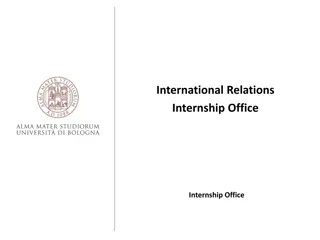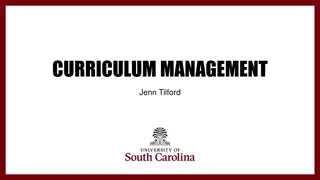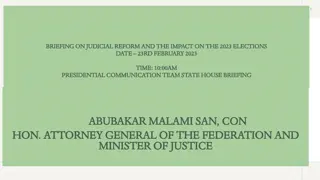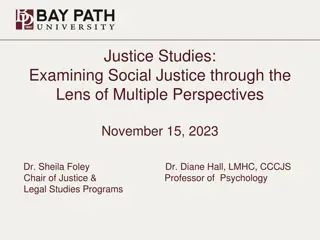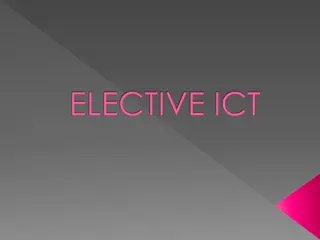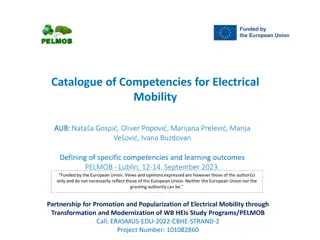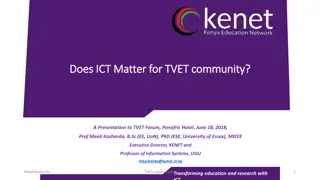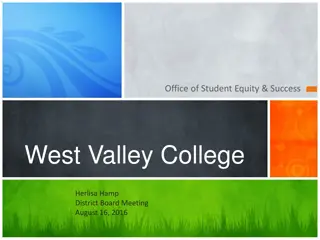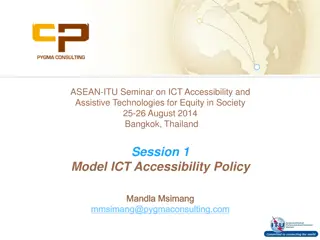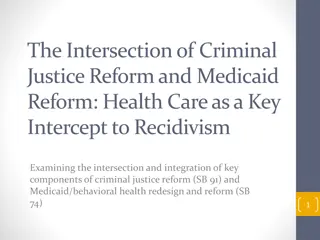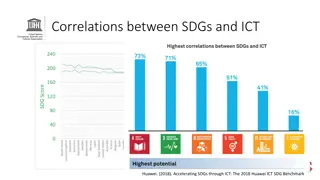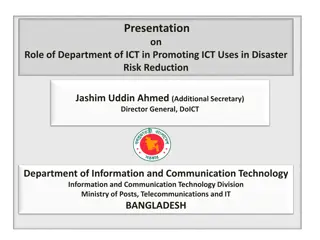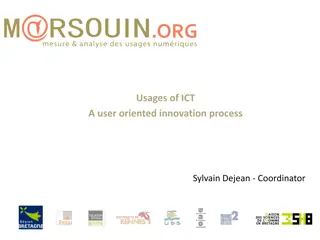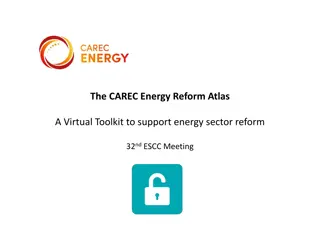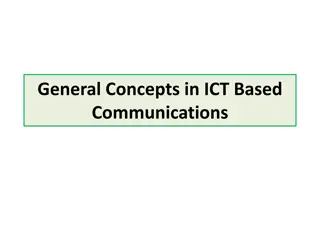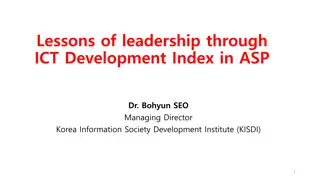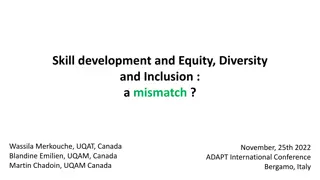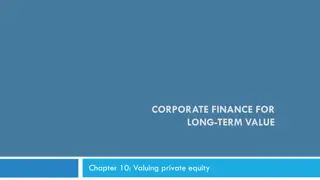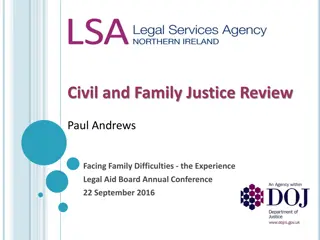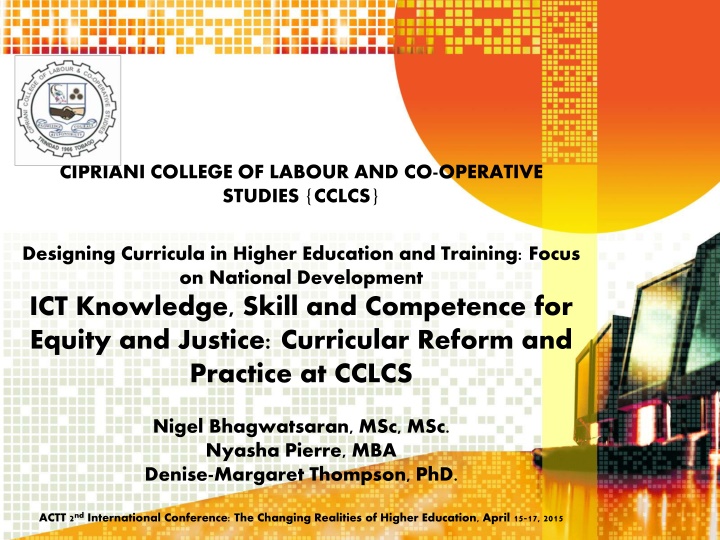
Innovative Higher Education and Training at CCLCS: Empowering Labor and Co-operative Movements
Explore the innovative curricular reforms and initiatives at CIPRIANI COLLEGE OF LABOUR AND CO-OPERATIVE STUDIES (CCLCS) focusing on ICT education, national development, and the mission to empower labor and co-operative movements locally and regionally. Discover specialized training programs, research initiatives, and a commitment to excellence in education and development.
Download Presentation

Please find below an Image/Link to download the presentation.
The content on the website is provided AS IS for your information and personal use only. It may not be sold, licensed, or shared on other websites without obtaining consent from the author. If you encounter any issues during the download, it is possible that the publisher has removed the file from their server.
You are allowed to download the files provided on this website for personal or commercial use, subject to the condition that they are used lawfully. All files are the property of their respective owners.
The content on the website is provided AS IS for your information and personal use only. It may not be sold, licensed, or shared on other websites without obtaining consent from the author.
E N D
Presentation Transcript
CIPRIANI COLLEGE OF LABOUR AND CO-OPERATIVE STUDIES {CCLCS} Designing Curricula in Higher Education and Training: Focus on National Development ICT Knowledge, Skill and Competence for Equity and Justice: Curricular Reform and Practice at CCLCS Nigel Bhagwatsaran, MSc, MSc. Nyasha Pierre, MBA Denise-Margaret Thompson, PhD. ACTT 2nd International Conference: The Changing Realities of Higher Education, April 15-17, 2015
Todays Agenda CCLCS Mission & Vision.. Equity and Justice? ICT Education, National Development & MTPF ICT Knowledge, Skill and Competence Curricular Reform/Review: Rationale, Process, Expected Outcomes CCLCS Curricular Reform and ICT: Deloitte & Touche CR Consultancy CIS 100 Review, Revision, Results! Conclusions
CCLCS VISION Proud tradition of accessible quality education, we aim to exceed the expectations of our Students, Staff and other Stakeholders, as the premier tertiary educational institution in the Caribbean, in areas of Labour, Co-operative Studies and a dynamic range of other specialized training programmes LEADER IN LABOUR & CO-OPERATIVE TRAINING, EDUCATION AND DEVELOPMENT
CCLCS MISSION To increase the capacity and consciousness of the Labour and Co-operative Movements, both locally and regionally, and to empower present and future working people. Foster and encourage critical thinking; Provide the highest quality educational and research programmes for our students in a physically and intellectually supportive learning environment; Provide and enable a highly committed, qualified, dynamic and professional staff; Be proactive and innovative in meeting the needs of all our stakeholders.
CCLCS PROGRAMMES Specialized Training & Degree Programmes Labour Studies Co-operative Studies Security Administration Project Management Human Resource Management Industrial Relations Public Relations and Marketing Occupational Safety, Health and the Environment
Policy Shift and New Initiatives Technology Use and Emphasis Mobilised Research Initiatives Professional Development and Specialised Training Unit Career Development & Guidance Performance Planning Specialised Courses Creative Low-Cost Approaches Bottom-up, Customer Service Orientation Standing CCLCS Committees Student Guild Involvement on Committees Security / ICT Infrastructure Upgrade
ICT CURRICULAR REFORM/REVIEW for EQUITY AND SOCIAL JUSTICE? Rationale Rationale Process Process Expected Outcomes Expected Outcomes
Some Definitions & Distinctions: Justice: Legal and/or Moral Correctness differing perspectives and concepts of philosophy, theology, religion, law, ethics, rationality, morality Equity: Quality of being Fair, Impartial and Inclusive.. justice according to natural law or right; freedom from bias or favoritism a risk interest or ownership right in property; common stock of a corporation Access: Ability or Right to Approach, Enter, Exit, Communicate with, or Make use of.. Academia: The Sacred Space dedicated to the Goddess of Wisdom, Athena the modern scientific and cultural world or community of learning, research and scholarship
SUMMARY OF THE CURRICULUM CHANGE EVENT AT CCLCS. First year introductory Information Technology Curriculum at CCLCS To equip all students with software development skills through the Introduction to Computer Information Systems (CIS 100) course CCLCS committed to empower and build capacity of the working class by providing opportunity for a 21st century skill and competence previously limited to the few.
IMPORTANCE OF CURRICULUM REFORM AND REDESIGN. 1. Ensures that curriculum addresses societal needs 2. Prepares students for the evolving requirements of the job market and labour trends 3. Ensures relevancy 4. Benchmarking and alignment with Industry Best Practices
Rationale for Software Development Rationale for Software Development and Coding in the IT Curriculum and Coding in the IT Curriculum 1. Within the context of an information technology led society and distributive justice where all students have fair access to opportunity 2. The College believes that intersecting ICTs in its curriculum and society s needs can help mould democratic students to contribute creatively in society 3. To address working class 21st century Information Poverty with respect to Software Development and Coding
THE IMPLEMENTATION PROCESS: 1. Starting with a mission to empower 2. Supported by a Deloitte and Touche CR Consultancy & Recommendations 3. Curriculum Redesign of Course by IT Faculty: Jul-Sep 2014. 4. Rollout: Sep-Dec 2014. 5. Faculty Coding Training: Oct 2014 Coding Conference, Atlanta 6. Mode of Delivery: Group projects, 5-6 students per team, problem based learning approach to writing programs. 7. Coding Presentations/Celebration held with relevant Industry stakeholders: Dec 5th 2014 and Jan 29th, 2015.
COURSE REQUIREMENTS BEFORE AND AFTER THE CURRICULUM CHANGE: Course Course requirements before requirements before the Curriculum Change: the Curriculum Change: Course requirements Course requirements after the Curriculum Change: the Curriculum Change: after 1. Laptop or desktop PC. 1.Laptop or desktop PC. 2. Windows 7 or higher. 2.Windows 7 or higher. 3. Microsoft Office 2007 or higher. 3.Microsoft Office 2007 or higher. 4. No prior knowledge required. 4.Java Netbeans Editor and Java Run Time Environment. 5.No prior knowledge required.
EXAMPLES OF CODING PROJECTS UNDERTAKEN BY STUDENT TEAMS: 1. Temperature converters. 2. BMI and Weight/Overweight Calculator. 3. Measurements Converter. 4. Mathematical Calculator. 5. Employee Address Book. 6. Creating Graphical User Interfaces for Windows Applications. 7. Sales processing system.
SNAP SHOT SAMPLE - TEMPERATURE CONVERTER CALCULATOR:
ENROLLMENT AND ACHIEVEMENT STATISTICS OF CIS 100 STUDENTS: Student Student Enrollment Enrollment : Year 1 of study. study. : Year 1 of 272 272 Students Completing the Coding Project Valsayn Campus: 47 South Campus: 25 Tobago Campus: 6 TOTAL: 78 72 Number of Students Passes in the subject Subject pass rate. 96% Number of Students Presenting Coding Projects in Live Format. 22
SUCCESSFUL OUTCOMES OF THE CURRICULUM REVIEW AND REDESIGN. 1. Students skills acquired: problem solving skills, coding and software development, software modelling, presentation skills. 2. 78 First-year First Semester students participating. 3. Over 90% passes in subject module. 4. Heightened excitement by students and faculty towards the coding initiative. 5. The forging of strategic relationships with industry ICT stakeholders: Columbus Communications, Microsoft Trinidad and Oracle USA.
WHAT ELSE WE LEARNED!... Bennis (1973) INDIVIDUAL STAGE MODEL OF INNOVATION ADOPTION Stage 1 Opposition Stage 2 Resistance Stage 3 Toleration Stage 4 Acceptance Stage 5 Support Stage 6 Embrace CCLCS was a PERFECT case study of Bennis and related models (Gilbert, 1995; Hall et al 1984, Hamelink, 1984; Havelock, 1971; Rogers, 1982). We look forward to now enjoying Stages 5 and 6!!
IMPLICATIONS FOR CURRICULUM IMPLICATIONS FOR CURRICULUM REVIEW AT CCLCS AND NEXT STEPS. REVIEW AT CCLCS AND NEXT STEPS. 1. Continued reengineering of course for more software development learning outcomes project based. 2. Intent to cross pollinate all other programmes of study at CCLCS with software development outcomes. 3. Resource Needs Analysis (RNA) to identify key resources required to implement curriculum changes. 4. Train the trainer workshop for CCLCS faculty and staff on software development and coding during Jul-Aug 2015 5. Coding workshop for primary and secondary school teachers in Aug 2015
CONCLUSIONS The curriculum change activity provided students with a 21st century skill for an equitable society. Increased students life chances despite their lack of opportunity to participate. This Curriculum Review Exercise successfully addressed traditional Information Poverty status of the working class Provided opportunity for entire College to acquire 21st Century skills and competence for academic, vocational and career equity!

